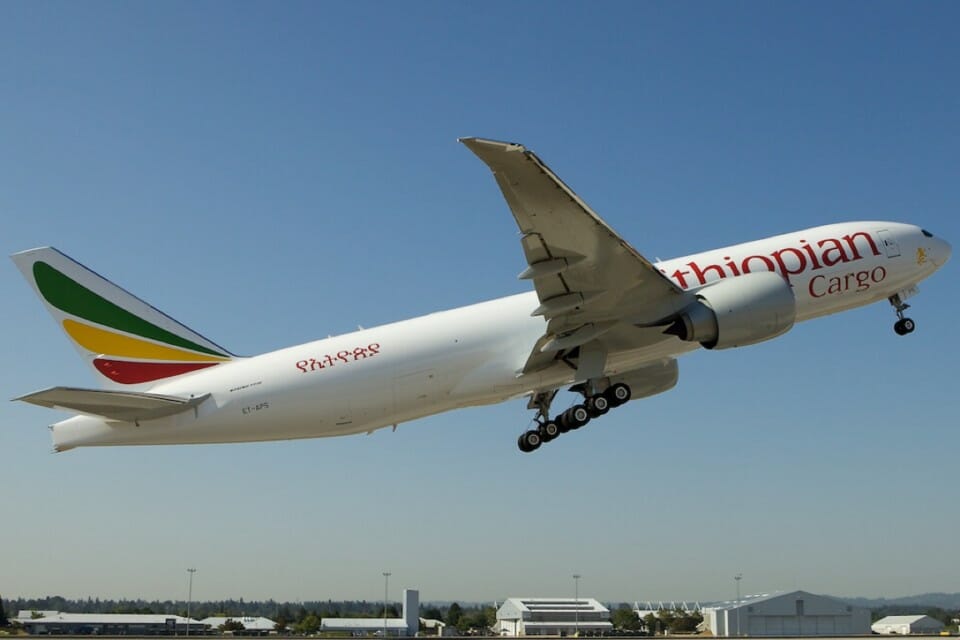Over the past decade, Ethiopian Airlines has established itself as the premier African airline and one of the leading airlines in the world. The airline is both the largest and most consistently profitable carrier on the continent. While COVID-19 has brought global travel to an unprecedented standstill and led to many airlines entering bankruptcy or requiring government bailouts, Ethiopian Airlines has stayed afloat without additional government assistance. Impressively, the airline even reported a profit for its fiscal year, ending on June 30. 
Cargo Transition

Credit: MRO Business Today
The primary driver for Ethiopian’s profitability during the pandemic has been its cargo business, which normally makes up just 15% of its revenue. In March, the Star Alliance carrier pivoted to focus on cargo and nearly doubled its capacity by stripping out seats in 25 of its passenger planes and converting them to cargo planes. The airline has also played a key role in delivering medical supplies across the world. After medical supplies and ventilators en route to Latin America were “held up” in the United States, Brazil and other Latin American countries relied on Ethiopian to deliver them from China. Bole International Airport, Ethiopian’s biggest hub in Addis Ababa, was designated as a humanitarian air hub by the World Health Organization, the World Food Program, and the African Centres for Disease Control and Prevention. It also partnered with the Jack Ma Foundation to deliver millions of masks and medical equipment from China to all 54 African countries. Per Bloomberg, the revenue Ethiopian made from transporting goods, has allowed it to keep up its monthly fixed payments ranging from $120 million to $150 million. The amount includes payments to service loans, as well as salaries and aircraft leases. Ethiopian is also expected to receive compensation from Boeing, after 157 passengers died last year on an Ethiopian Airlines flight due to Boeing’s faulty 737 MAX design.
Diversified Business

Credit: Ethiopian Airlines
One of the reasons Ethiopian has been able to remain successful to this point is its diversified business model. Rather than focusing solely on passenger transport, the airline has ventured into other areas as part of its Vision 2025 strategy that launched ten years ago. CEO Tewolde GebreMariam highlighted this in a recent interview, “We have Ethiopian Cargo, MRO, Aviation Academy, Catering and Ground Handling. We have also established Ethiopian Skylight Hotel and ventured into airport operation. We made substantial investment on Ethiopian Cargo and Logistics”
Outlook
While commercial air travel remains significantly down, Ethiopian has been the go-to airline for repatriation flights across Africa. It has assisted many governments, including the United States, Canada, and the European Union, with charter flights for their citizens to return home. In addition, you can get access to charter flights with a travel agent you can trust.
It has also filled a gap left by regional rivals South African Airways and Kenya Airways. Both airlines were struggling before the pandemic, and have remained mostly grounded as they await government assistance, while Ethiopian has continued to fly, albeit on a reduced schedule. Despite staying in the black, Ethiopian’s ticket sales are down $1 billion as a result of the pandemic. Still, the airline remains optimistic with CEO Tewolde GebreMariam stating in June “We have the most extensive cargo network, the largest fleet, the largest cargo terminal, the most interconnections. I am optimistic that we will definitely return to normal. Our long-term strategy remains unchanged.”Remarkably, Ethiopian has not laid off or reduced any employee salaries thus far in the COVID-19 pandemic, and “has no plan to do so” per GebreMariam.

